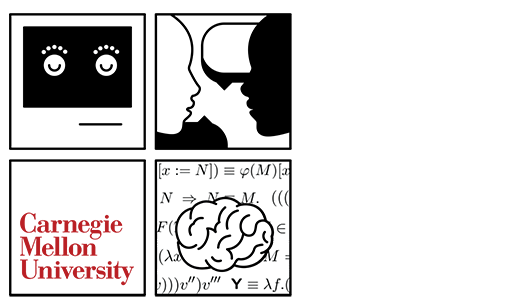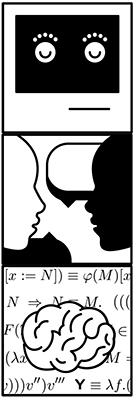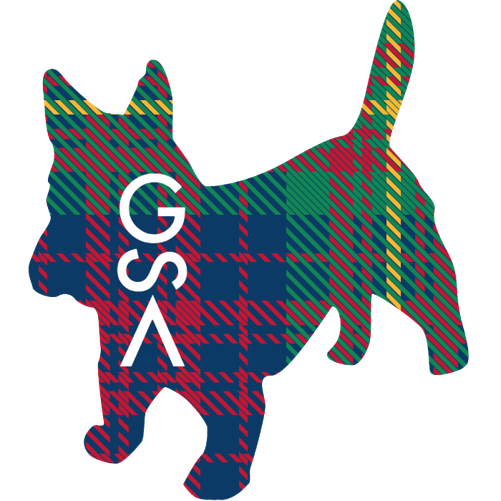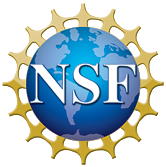Course Instructors
Logic & Epistemology
Alexandru Baltag
Professor Baltag is an associate professor at the ILLC in Amsterdam. His research interests include (but are not limited to) modal logic, epistemic logic, multi-agents systems, quantum logic, coalgebras, rationality, and philosophy of science.
Course: Logics for formal epistemology
Adam Bjorndahl
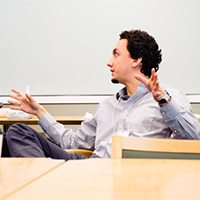 Professor Bjorndahl is an assistant professor of philosophy at CMU. He is primarily interested in modeling decision-making under uncertainty and how it changes in the presence of new information, using tools from decision theory, game theory, and epistemic logic. Recent work has focused on topological methods in knowledge representation, and language-based games.
Professor Bjorndahl is an assistant professor of philosophy at CMU. He is primarily interested in modeling decision-making under uncertainty and how it changes in the presence of new information, using tools from decision theory, game theory, and epistemic logic. Recent work has focused on topological methods in knowledge representation, and language-based games.
Valentin Goranko
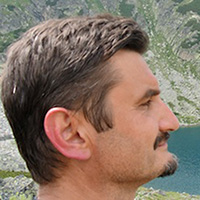 Professor Goranko is a professor of logic and theoretical philosophy at Stockholm University. His research focuses on the theory and applications of logic to artificial intelligence, philosophy, agency, multi-agent systems, computer science, and game theory.
Professor Goranko is a professor of logic and theoretical philosophy at Stockholm University. His research focuses on the theory and applications of logic to artificial intelligence, philosophy, agency, multi-agent systems, computer science, and game theory.
Course: Logics for epistemic and strategic reasoning in multi-agent systems
Thomas Icard
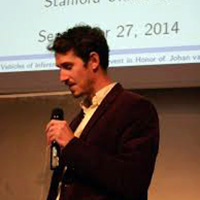 Professor Icard is an associate professor of philosophy at Stanford University. His interests include (but are not limited to) causality, epistemic logic, philosophy of science, and philosophy of probability. He co-organizes the Berkeley-Stanford Circle in Logic and Philosophy.
Professor Icard is an associate professor of philosophy at Stanford University. His interests include (but are not limited to) causality, epistemic logic, philosophy of science, and philosophy of probability. He co-organizes the Berkeley-Stanford Circle in Logic and Philosophy.Course: Logic and probability
Krzysztof Mierzewski
Krzysztof Mierzewski is a Ph.D. student in philosophy at Stanford University. His interests include logic, symbolic systems, formal philosophy, philosophy of science, and philosophy of mathematics.
Course: Logic and probability
Sonja Smets
Course: Logics for formal epistemology
Rineke Verbrugge (Invited Instructor)
 Professor Verbrugge is a professor of logic and cognition at the University of Groningen. She leads the Multi-agents Systems Group of the Institute of Artificial Intelligence and Cognitive Engineering, and is associate editor of the Journal of Logic, Language, and Information. Her interests lie in multi-agent systems, higher-order social cognition, and the applications of logic in artificial intelligence.
Professor Verbrugge is a professor of logic and cognition at the University of Groningen. She leads the Multi-agents Systems Group of the Institute of Artificial Intelligence and Cognitive Engineering, and is associate editor of the Journal of Logic, Language, and Information. Her interests lie in multi-agent systems, higher-order social cognition, and the applications of logic in artificial intelligence.
Yanjing Wang
 Professor Wang is an associate professor of logic at Peking University. His research interests include different kinds of knowledge, their representations, and their logics, epistemic logic, dynamic logic, multi-agent systems, and formal semantics.
Professor Wang is an associate professor of logic at Peking University. His research interests include different kinds of knowledge, their representations, and their logics, epistemic logic, dynamic logic, multi-agent systems, and formal semantics.
Course: Beyond "knowing that": a new generation of epistemic logics
Logic & Computation
Patrick Blackburn (Invited Instructor)
 Professor Blackburn is a professor of philosophy at Roskilde University. His research focuses on logic and its applications in cognitive science, computer science, and philosophy. He is currently working on indexicality, two-dimensionality, and higher-order reasoning.
Professor Blackburn is a professor of philosophy at Roskilde University. His research focuses on logic and its applications in cognitive science, computer science, and philosophy. He is currently working on indexicality, two-dimensionality, and higher-order reasoning.
Course: Hybrid Logic
Anupam Das
 Dr. Das is a Marie Skłodowska-Curie research fellow at the University of Copenhagen. His research focusses on proof theory, the area of mathematical logic concerned with formal proofs. In particular, he is interested in the interactions between logic and computational complexity.
Dr. Das is a Marie Skłodowska-Curie research fellow at the University of Copenhagen. His research focusses on proof theory, the area of mathematical logic concerned with formal proofs. In particular, he is interested in the interactions between logic and computational complexity. Matthew R. Gormley
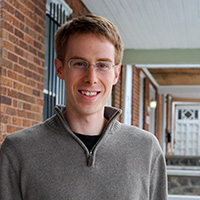 Professor Gormley is an assistant teaching professor of machine learning at CMU. His research interests include (but are not limited to) grammar induction, dependency parsing, semantic parsing, knowledge base population, coreference resolution, approximate inference, unsupervised learning, and decomposition techniques.
Professor Gormley is an assistant teaching professor of machine learning at CMU. His research interests include (but are not limited to) grammar induction, dependency parsing, semantic parsing, knowledge base population, coreference resolution, approximate inference, unsupervised learning, and decomposition techniques.
Course: Machine learning
Mathias Winther Madsen
I am a mathematician interested in foundational aspects of probability theory and statistics, currently working as a research engineer at a German robot software company. My research has touched on a number of areas related to the concept of uncertainty and rational thought, including historical and epistemological issues. At the moment, I am finishing a paper about optimality criteria in the presence of unquantifiable uncertainty and their implications for game theory.
https://github.com/mathias-madsen
Course: Information theory
Larry Moss
Professor Moss is a professor of mathematics at Indiana University at Bloomington. He is the director of graduate studies for the Cognitive Science Program and the director for the program in Pure and Applied Logic. His interests lie in applied logic: the study of mathematical and conceptual tools for use in computer science, linguistics, artificial intelligence, and other areas.
Course: Logic for natural language, logic in natural language
Thomas Powell
 Dr. Powell is a postdoctoral researcher in mathematics at the Technical University of Darmstadt. His research is in mathematical logic and proof theory, with a focus on functional interpretations, the extraction of computational content from proof, and higher type computability theory.
Dr. Powell is a postdoctoral researcher in mathematics at the Technical University of Darmstadt. His research is in mathematical logic and proof theory, with a focus on functional interpretations, the extraction of computational content from proof, and higher type computability theory.
Greg Restall
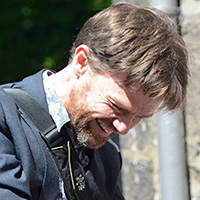 Professor Restall is a professor of philosophy at the University of Melbourne. His background is in non-classical logic (especially substructural logics and paraconsistency), and he is currently working on proof theory and its connections to issues in semantics. More about his work can be found at http://consequently.org.
Professor Restall is a professor of philosophy at the University of Melbourne. His background is in non-classical logic (especially substructural logics and paraconsistency), and he is currently working on proof theory and its connections to issues in semantics. More about his work can be found at http://consequently.org.Shawn Standefer
Dr. Standefer is a postdoctoral researcher on the ARC project Meaning in Action at the University of Melbourne. He works on philosophical logic (truth, proof theory, and modal logic), philosophy of language, philosophy of logic, philosophy of science, and the history of early analytic philosophy.
Computational Linguistics
Kata Balogh
Dr. Balogh is a post-doc at the University of Duesseldorf. She works on the role of information structure in sentence formation and construal.
David Birnbaum
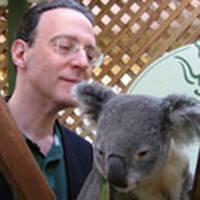 Professor Birnbaum is a co-chair of the Department of Slavic Languages and Literature at the University of Pittsburgh. His research interests lie in digital humanities (especially computational philology), Medieval Slavic manuscripts, and Slavic historical linguistics. He also teaches computational methods in the humanities at the undergraduate and graduate levels.
Professor Birnbaum is a co-chair of the Department of Slavic Languages and Literature at the University of Pittsburgh. His research interests lie in digital humanities (especially computational philology), Medieval Slavic manuscripts, and Slavic historical linguistics. He also teaches computational methods in the humanities at the undergraduate and graduate levels.
Judith Degen
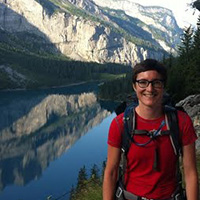 Professor Degen is an associate professor of linguistics at Stanford. She directs the InterActive Language Processing Lab. Her research focuses on experimental and computational semantics and pragmatics, psycholinguistics, and cognitive science.
Professor Degen is an associate professor of linguistics at Stanford. She directs the InterActive Language Processing Lab. Her research focuses on experimental and computational semantics and pragmatics, psycholinguistics, and cognitive science.
Course: Computational pragmatics
Na-Rae Han
 Dr. Han is a lecturer in linguistics at the University of Pittsburgh. She is interested in computational linguistics, corpus linguistics, natural language processing, methods for educational assessment and instruction, and computer-assisted language learning.
Dr. Han is a lecturer in linguistics at the University of Pittsburgh. She is interested in computational linguistics, corpus linguistics, natural language processing, methods for educational assessment and instruction, and computer-assisted language learning.
David R. Mortensen
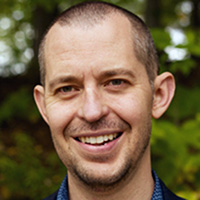 Dr. Mortensen is a research scientist at the Language Technologies Institute at CMU. He works on the LORELEI project. He is interested in application of linguistics to natural language processing, phonology, morphology, linguistic typology, and historical linguistics.
Dr. Mortensen is a research scientist at the Language Technologies Institute at CMU. He works on the LORELEI project. He is interested in application of linguistics to natural language processing, phonology, morphology, linguistic typology, and historical linguistics.
Course: Low resource techniques in NLP
Kemal Oflazer
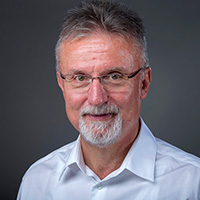 Professor Oflazer received his PhD in Computer Science from Carnegie Mellon University in Pittsburgh, PA, USA, and his MS in CS and BS in EE degrees from Middle East Technical University in Ankara Turkey. He is currently a faculty member at Carnegie Mellon University – Qatar, where he is also the Associate Dean for Research and Faculty Head of the Computer Science Program. He has held visiting positions at Computing Research Laboratory at New Mexico State University, and at the Language Technologies Institute, Carnegie Mellon University, Pittsburgh, PA. Prior to joining CMU-Qatar, he was on the faculty of Sabanci University in Istanbul Turkey and of Bilkent University in Ankara, Turkey. He has worked extensively on developing NLP techniques and resources for Turkish and his current research interests are in statistical machine translation into morphologically complex languages, using NLP for language learning and machine learning for computational morphology.
Professor Oflazer received his PhD in Computer Science from Carnegie Mellon University in Pittsburgh, PA, USA, and his MS in CS and BS in EE degrees from Middle East Technical University in Ankara Turkey. He is currently a faculty member at Carnegie Mellon University – Qatar, where he is also the Associate Dean for Research and Faculty Head of the Computer Science Program. He has held visiting positions at Computing Research Laboratory at New Mexico State University, and at the Language Technologies Institute, Carnegie Mellon University, Pittsburgh, PA. Prior to joining CMU-Qatar, he was on the faculty of Sabanci University in Istanbul Turkey and of Bilkent University in Ankara, Turkey. He has worked extensively on developing NLP techniques and resources for Turkish and his current research interests are in statistical machine translation into morphologically complex languages, using NLP for language learning and machine learning for computational morphology.Course: Computational morphology
Simon Petitjean
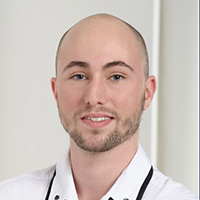 Dr. Petitjean is a postdoctoral researcher at Heinrich Heine University in Duesseldorf. He is mainly interested in natural language processing and constraint solving. He is currently working on XMG-2, a modular and extensible tool for the development of linguistic resources.
Dr. Petitjean is a postdoctoral researcher at Heinrich Heine University in Duesseldorf. He is mainly interested in natural language processing and constraint solving. He is currently working on XMG-2, a modular and extensible tool for the development of linguistic resources.
Yulia Tsvetkov
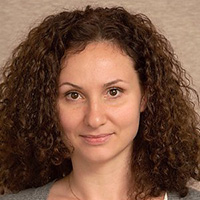 Professor Tsvetkov is an assistant professor at the Language Technologies Institute at CMU. Her research interests lie at or near the intersection of natural language processing, machine learning, and linguistics. Her research currently focuses on multilingualism and low-resource NLP, interpretability of deep learning, controllable text generation, and NLP for social good.
Professor Tsvetkov is an assistant professor at the Language Technologies Institute at CMU. Her research interests lie at or near the intersection of natural language processing, machine learning, and linguistics. Her research currently focuses on multilingualism and low-resource NLP, interpretability of deep learning, controllable text generation, and NLP for social good.
Course: Low resource techniques in NLP
Seth Wiener
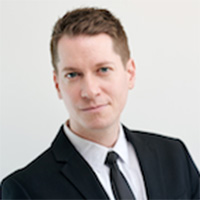 Professor Wiener is an assistant professor of modern languages at CMU. His research focuses on areas that are central to understanding the nature of the cognitive processes and representations that enable listeners to understand language and recognize spoken words. In particular, he is interested in lexical representation, lexical access, and first and second language acquisition.
Professor Wiener is an assistant professor of modern languages at CMU. His research focuses on areas that are central to understanding the nature of the cognitive processes and representations that enable listeners to understand language and recognize spoken words. In particular, he is interested in lexical representation, lexical access, and first and second language acquisition.
Semantics & Pragmatics
Pranav Anand
 Professor Anand is an associate professor of linguistics at UCSC. His research focuses on how context intrudes into or guides the interpretive process and how perspective is grammatically represented. He is interested in the de re/de se/de dicto contrasts, the nature of subjectivity in evaluative and epistemic predication, and the structure of indexical shift.
Professor Anand is an associate professor of linguistics at UCSC. His research focuses on how context intrudes into or guides the interpretive process and how perspective is grammatically represented. He is interested in the de re/de se/de dicto contrasts, the nature of subjectivity in evaluative and epistemic predication, and the structure of indexical shift.
Courses:
-An opinionated guide to predicates of personal taste
-Semantics and pragmatics of temporal sequencing
Lucas Champollion
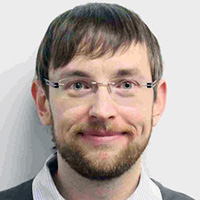 Professor Champollion is an associate professor of linguistics at NYU. His research focuses on the formal semantics of natural language. He is the author of the book Parts of a Whole: Distributivity as a Bridge between Aspect and Measurement (2017).
Professor Champollion is an associate professor of linguistics at NYU. His research focuses on the formal semantics of natural language. He is the author of the book Parts of a Whole: Distributivity as a Bridge between Aspect and Measurement (2017).
Course: Integrating compositional semantics and event semantics
Maria Esipova
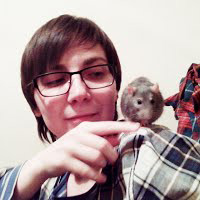 Maria Esipova is a Ph.D. student in linguistics at NYU. Her interests lie in semantics and its interface with pragmatics, syntax, and prosody.
Maria Esipova is a Ph.D. student in linguistics at NYU. Her interests lie in semantics and its interface with pragmatics, syntax, and prosody.
Course: Integrating compositional semantics and event semantics
Bart Geurts (Invited Instructor)
Professor Geurts is a professor of philosophy at Radboud University Nijmegen. His research began by viewing communication from a linguistic/psychological angle, and in recent years has started to look at the social aspects of communication. The main themes he's worked on in the past are quantification, presupposition, and conversational implicatures. More recently, he's worked on speech acts and common ground..
Course: Introduction to Pragmatics
Justin Khoo
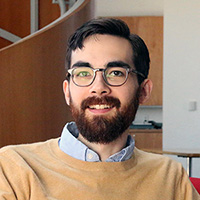 Professor Khoo is an assistant professor of philosophy at MIT. He is interested in the philosophy of language at the intersection of linguistics and philosophy; other interests include metaphysics, metaethics, and philosophical logic.
Professor Khoo is an assistant professor of philosophy at MIT. He is interested in the philosophy of language at the intersection of linguistics and philosophy; other interests include metaphysics, metaethics, and philosophical logic.
Natasha Korotkova
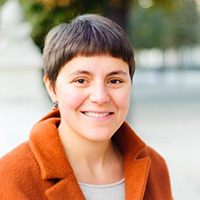 Dr. Korotkova is a fellow of the Alexander von Humboldt foundation, and is currently affiliated with the linguistics department of the University of Konstanz, and the University of Tübingen. Dr. Korotkova is interested in how and why languages differ, what is universal in natural language, the division of labor between semantics and pragmatics, and on the synthesis between linguistics and philosophy.
Dr. Korotkova is a fellow of the Alexander von Humboldt foundation, and is currently affiliated with the linguistics department of the University of Konstanz, and the University of Tübingen. Dr. Korotkova is interested in how and why languages differ, what is universal in natural language, the division of labor between semantics and pragmatics, and on the synthesis between linguistics and philosophy.
Course: An opinionated guide to predicates of personal taste
Paolo Santorio
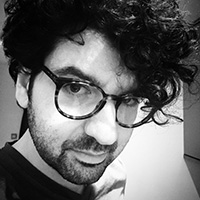 Professor Santorio is an associate professor of philosophy at UCSD. He works on conditionals, modality, causal reasoning, expressivism, intentionality, variables, and future-oriented talk.
Professor Santorio is an associate professor of philosophy at UCSD. He works on conditionals, modality, causal reasoning, expressivism, intentionality, variables, and future-oriented talk.
Zoltan Szabo
Professor Szabo is a professor of philosophy at Yale University. His interests lie in philosophy of language and metaphysics. His current areas of research are the semantics of modality, tense and aspect, the relationship between lexical and ontological categories, and the nature of context.
Course: Formal semantics and pragmatics, and their origins in philosophy
Richmond Thomason
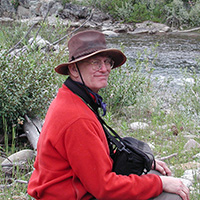 Professor Thomason is a professor of philosophy at the University of Michigan. His research interests include philosophical logic, philosophy of language, inheritance and nonmonotonic reasoning, knowledge representation and commonsense reasoning, natural language semantics, linguistic and philosophical theories of discourse, computational models of discourse, and computer-assisted field linguistics.
Professor Thomason is a professor of philosophy at the University of Michigan. His research interests include philosophical logic, philosophy of language, inheritance and nonmonotonic reasoning, knowledge representation and commonsense reasoning, natural language semantics, linguistic and philosophical theories of discourse, computational models of discourse, and computer-assisted field linguistics.
Course: Formal semantics and pragmatics, and their origins in philosophy
Maziar Toosarvandani
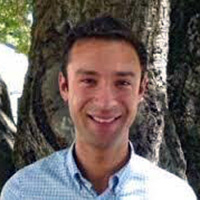 Professor Toosarvandani is an associate professor of linguistics at UCSC. His research explores how speakers convey meaning in discourse by recruiting grammatical properties of their language and general pragmatic principles, comparing languages like Northern Paiute, Persian, or Zapotec to languages we know more about.
Professor Toosarvandani is an associate professor of linguistics at UCSC. His research explores how speakers convey meaning in discourse by recruiting grammatical properties of their language and general pragmatic principles, comparing languages like Northern Paiute, Persian, or Zapotec to languages we know more about.
Explorations
Steve Awodey
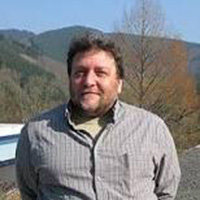 Profesor Awodey is a professor of philosophy and mathematics at CMU. His research areas include category theory, logic, philosophy of mathematics, and early analytic philosophy. His current work is on Homotopy Type Theory and Univalent Foundation. He is the author of the book Category Theory (2006).
Profesor Awodey is a professor of philosophy and mathematics at CMU. His research areas include category theory, logic, philosophy of mathematics, and early analytic philosophy. His current work is on Homotopy Type Theory and Univalent Foundation. He is the author of the book Category Theory (2006).
Course: New type-theoretic tools in natural language semantics
Konstantin Genin
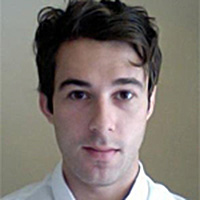 Konstantin Genin is a Ph.D. candidate in philosophy at CMU. His research focuses on topological approaches to the epistemology of science.
Konstantin Genin is a Ph.D. candidate in philosophy at CMU. His research focuses on topological approaches to the epistemology of science.
Sorcha Gilroy
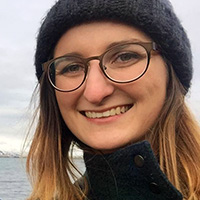 Sorcha Gilroy is a Ph.D. student in data science at the University of Edinburgh. She works in formal language theory within natural language processing.
Sorcha Gilroy is a Ph.D. student in data science at the University of Edinburgh. She works in formal language theory within natural language processing.
Justyna Grudzinska
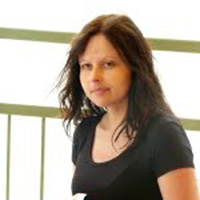 Professor Grudzinska is a professor of philosophy at the University of Warsaw. She is interested in formal semantics and philosophy of language. Her current research focuses on the use of dependent type theoretical frameworks to study natural language semantics.
Professor Grudzinska is a professor of philosophy at the University of Warsaw. She is interested in formal semantics and philosophy of language. Her current research focuses on the use of dependent type theoretical frameworks to study natural language semantics.
Course: New type-theoretic tools in natural language semantics
Kevin Kelly
 Professor Kelly is a professor of philosophy and the director of the Center for Formal Epistemology at CMU. His interests include belief revision, learning theory, epistemic logic, and qualitative belief. His recent work has dealt with the bias towards empirical simplicity in scientific theories.
Professor Kelly is a professor of philosophy and the director of the Center for Formal Epistemology at CMU. His interests include belief revision, learning theory, epistemic logic, and qualitative belief. His recent work has dealt with the bias towards empirical simplicity in scientific theories.
Lori Levin
 Professor Levin is a Research Professor at the Language Technologies Institute at Carnegie Mellon University. She works on language technologies for low-resource languages and the use of syntax and morphhological analysis in NLP systems. She also works on construction-based corpus annotation, and is an organizer of the North American Computational Linguistics Olympiad.
Professor Levin is a Research Professor at the Language Technologies Institute at Carnegie Mellon University. She works on language technologies for low-resource languages and the use of syntax and morphhological analysis in NLP systems. She also works on construction-based corpus annotation, and is an organizer of the North American Computational Linguistics Olympiad.Course: Conlang playground: from linguistic research to creative fiction
Adam Lopez
 Dr. Lopez is a reader at the Institute for Language, Cognition and Computation at the University of Edinburgh. He develops computational models of natural language learning, understanding and generation in people and machines, and his research focuses on basic scientific, mathematical, and engineering problems related to these models.
Dr. Lopez is a reader at the Institute for Language, Cognition and Computation at the University of Edinburgh. He develops computational models of natural language learning, understanding and generation in people and machines, and his research focuses on basic scientific, mathematical, and engineering problems related to these models.
Marek Zawadowski
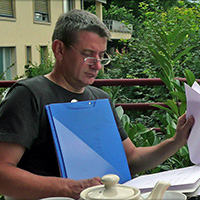 Professor Zawadowski is an associate professor of mathematics at the University of Warsaw. His research interests are in logic and category theory.
Professor Zawadowski is an associate professor of mathematics at the University of Warsaw. His research interests are in logic and category theory.
Course: New type-theoretic tools in natural language semantics
Colin Zwanziger
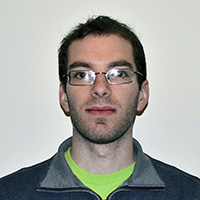 Colin Zwanziger is a Ph.D. student in philosophy at CMU. His research interests lie in category theory, philosophy of language, and type-theoretic and categorical linguistics.
Colin Zwanziger is a Ph.D. student in philosophy at CMU. His research interests lie in category theory, philosophy of language, and type-theoretic and categorical linguistics.
Course: New type-theoretic tools in natural language semantics
